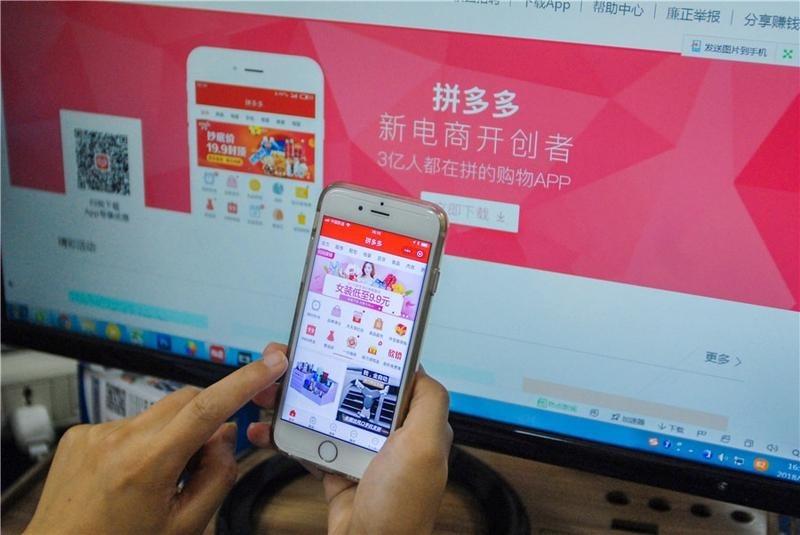 In this undated file photo, a Pinduoduo user shows the app on the smartphone in Beijing. (PHOTO / CHINA DAILY)
In this undated file photo, a Pinduoduo user shows the app on the smartphone in Beijing. (PHOTO / CHINA DAILY)
Autumn is hairy crab harvesting season, especially in the Yangtze River Delta.
Along the shores of Yangcheng Lake near Shanghai, fine-dining restaurants and local eateries are scrambling to roll out pricey crab menus.
Pinduoduo's endeavor to help accelerate the digitalization of the agricultural supply chain is a good example of how e-commerce is unleashing growth potential across all sectors
But experts estimate a lion's share of the crabs on the market claiming to be from Yangcheng Lake-a premier crab-rearing region-is essentially dumped from other areas around harvest season and then pulled out for consumption. The practice is so widespread that it's even given rise to the phrase "bathing crabs".
To tackle the problem, e-commerce company Pinduoduo has formed an alliance with the crab industry and authorities in the delta region to help different geographical locations build their brands and improve market access to consumers through its online platforms.
ALSO READ: Internet economy helps sustain economic growth
Specifically, direct sourcing from tens of thousands of merchants can help track the origins of crabs, and it will work with the Jiangsu Fresh Water Aquatic Products Research Institute to set industry standards for online sales of hairy crabs.
The company also pledged to nurture 100 leading e-commerce merchants and expand the online market for hairy crabs by 20 billion yuan (US$2.97 billion) within five years.
ALSO READ: Pinduoduo disrupts China's e-commerce
"Online penetration of agricultural products remains significantly lower compared with other physical goods," said Chen Qiu, vice-president of Pinduoduo. "The 'crab model' can be duplicated to the promotion of agricultural specialties in the future."
Pinduoduo's endeavor to help accelerate the digitalization of the agricultural supply chain is a good example of how e-commerce is unleashing growth potential across all sectors.
The 13th Five-Year Plan (2016-20) has stipulated that the implementation of an Internet Plus strategy should serve to revolutionize production and organization modes, improve the quality and efficiency of supply and stimulate real demand to strengthen new growth momentum.
Agriculture aside, e-commerce is fostering emerging Chinese brands. They then leverage a suite of internet tools from data analytics to livestreaming marketing to customize offerings and quickly respond to market needs.
For instance, furniture maker Yuanshi Muyu teamed up with Alibaba's Tmall platform to tailor products based on customer preferences, such as a single bed equipped with lighting to fit the requirements of young professionals who need work into the wee hours.
By adopting content marketing, such as the creation of short videos and tracing customer feedback, we've managed to keep precise track of changing customer needs and expand our meal replacement offerings to a broader scale.
Wang Liang, secretary to the chairman of Shanghai Mint Information Technology Co Ltd
According to branding director Chen Jie, it would normally require two to three months from idea conceptualization, mass production and then product delivery. And at the height of such collaboration, some 100 co-created new items could be unveiled per month.
The company is also engaged in livestreaming, a popular marketing approach in China by having a dedicated host interact with prospective buyers in real time. Chen said gross merchandise volume generated from such channels could amount to 30 million yuan per month.
READ MORE: Pinduoduo reports strong growth
Also riding the livestreaming and data analytics bandwagon is fitness mobile app Mint, which provides exercise courses and nutritious diets to those seeking healthier lifestyles.
"By adopting content marketing, such as the creation of short videos and tracing customer feedback, we've managed to keep precise track of changing customer needs and expand our meal replacement offerings to a broader scale," said Wang Liang, secretary to the chairman of Shanghai Mint Information Technology Co Ltd.
Innovative practices in e-commerce have also played a pivotal role in driving exports. For instance, weight limitations are common problems facing cross-border retail exporters. E-commerce site AliExpress opened up the world's first dedicated bulk logistics line, which raised the weight limit from the previous 30 kilograms to up to 300 kg, and made the entire transport process transparent and traceable.
Zhejiang Ben Auto Manufacturing Co is one beneficiary of such services. Thanks to the service launched in July, the company managed to secure 1,000 overseas orders for electric scooters in the past two months, said Cai Weimin, general manager of the company's overseas business division.
"We managed to sell up to 200 such cars in a week or two, and now we've been prepping for selling 3,000 units during the upcoming Nov 11 Shopping Festival," Cai said.


